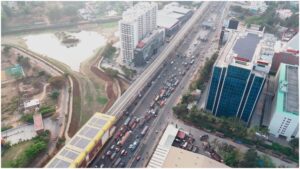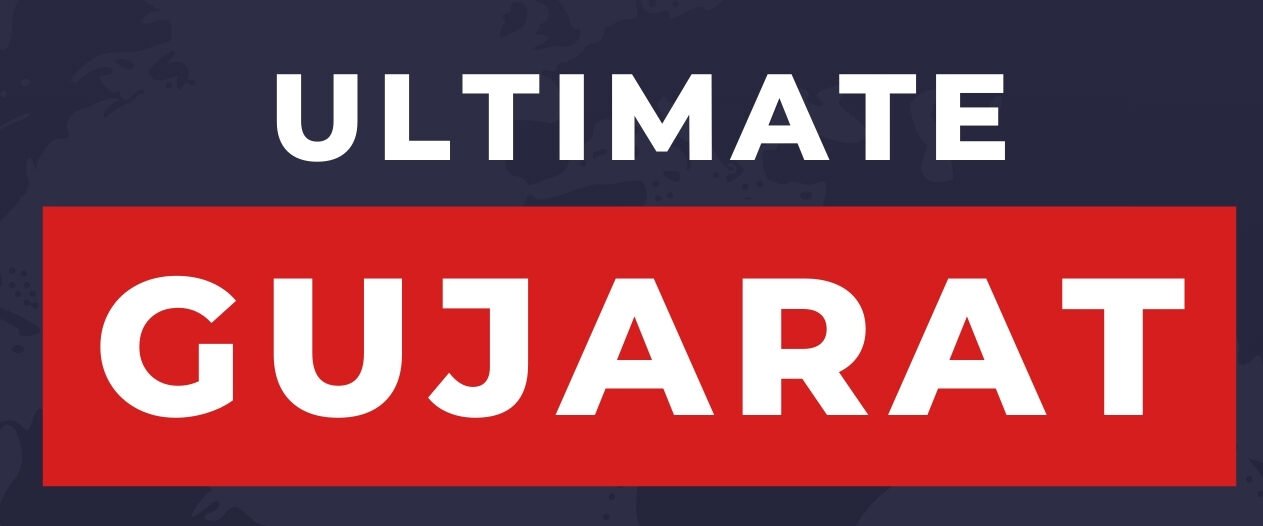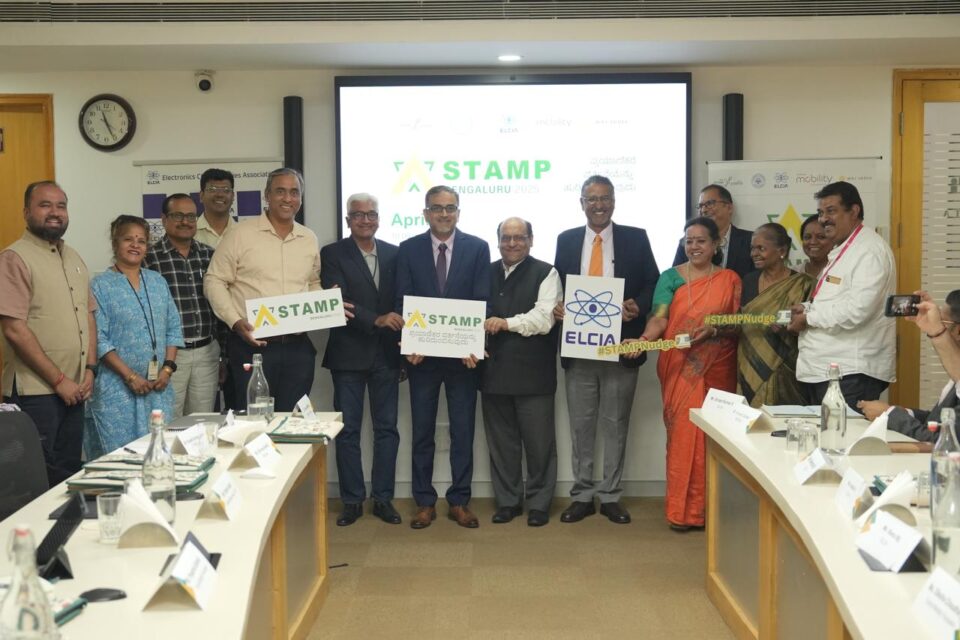LAUNCHED: STAMP Innovation Challenge Invites Applications to Boost Public Transport Usagein Electronic City.
Bengaluru 11 April 2025: The Bengaluru Metro Rail Corporation Limited (BMRCL), Bengaluru Metropolitan Transport Corporation (BMTC), and the Electronics City Industries Association (ELCIA), in collaboration with Toyota Mobility Foundation (TMF) and WRI India todaylaunched the “STAMP: Nudging Commuter Behaviour”—a pioneering initiative that leverages behavioural science and technology to encourage commuters to shift from personal vehicles to public transport.
PROJECT BACKGROUND
With the Namma Metro Yellow Line set to launch later in 2025, Electronic City—one of Bengaluru’s largest employment hubs—will be better connected to the city.This expansion will bring over one lakh jobs closer to the metro network, offering a faster and more sustainable alternative to private transport. Recently introducedBMTC feeder buses,launched in collaboration with ELCIA and the Electronics City Industrial Township Authority (ELCITA),are providing first- and last-mile connectivityin the area.
The Station Access and Mobility Program (STAMP), led by TMF and WRI India, has been working to bridge the connectivity gap to taking public transport in Indian cities, by combining research with innovative pilots, from electric autorickshaws to a carpooling app. Launched in Bengaluru in 2017, STAMP has since expanded to six cities: Hyderabad, Kochi, Mumbai, Pune, Nagpur, and Delhi, enabling over 50,000 last-mile metro trips and saving 240,000 passenger minutes. Using a four-step model, it identifies gaps and customizes solutions based on each city’s metro system.
A 2023 working paper by Toyota Mobility Foundation and WRI India titled, “Improving metro access in India: Evidence from three cities” shows that commuters tend to avoid the metro due to last-mile costs and wait times. They also show that high-income commuters (earning over ₹60,000/month) rarely use metro services, preferring personal vehicles due to expensive last-mile options. Compared to cities like Nagpur and Delhi, Bengaluru commuters face higher last-mile costs, making metro accessibility a challenge. Behavioural science is emerging as a critical tool in urban mobility, enabling data-driven interventions that shift commuter habits and make public transport the preferred choice.
STAMP: Nudging Commuter Behaviour imbibes the learnings and successes of previous STAMP editions in Bengaluru, Hyderabad, Kochi, and Mumbai, by focusing on a distinct segment of commuters: high-income individuals who are choice users of public transport. Previous versions of STAMP have revealed that the cost of last-mile connectivity for affluent commuters is higher in Bengaluru compared to cities like Nagpur and Delhi.
PROJECT OBJECTIVE
This program aims to address the barriers of last-mile accessibility and higher costs of travel by combining behavioral science principles with technology-driven solutions, to ensure a more efficient and sustainable urban transport system for all. The project strives to lower emissions, reduce congestion and increase the shift to sustainable transport for the commuters.
STAMP INNOVATION CHALLENGE
As part of this initiative, the Station Access and Mobility Program (STAMP) launched an innovation challenge, inviting startups, technology firms, and industry partners to develop scalable mobility solutions that encourage metro usage in Electronic City. Innovators from around the world are welcome to apply; however, they must collaborate with an Indian partner.
The overall theme of STAMP’s innovation challenge isto leverage behavioural science to enhance public transport for commuters in ElectronicCity.
The potential solutions should incorporate:
- Gamification: Incentives for eco-friendly transport choices
- Real-time Nudges: Prompts during peak transit times to encourage shared mobility and reduce congestion.
- Inclusive Access: Behaviour-driven solutions enhancing last-mile access, affordability, safety, and convenience for diverse commuter needs.
Challenge period: April – June 2025
Selected teams will receive funding from a total implementation grant of USD 100,000 to further develop and pilot their solutions. The Challenge will also include a bootcamp with Ashoka University’s Centre for Social and Behaviour Change, offering behavioural science insights.
Finalists will receive support in the following three areas:
- Enterprise: Business development and strategy, pilot design, government engagement tools and other technical support.
- Exposure: Access to a wide network of domain experts, government and local authority representatives for feedback and advice.
- Financial support: Shortlisted enterprises will be awarded with prize money for further development and piloting the innovation technology idea, product or services.
For more information on the application process, last date for applying and timeline for processing of application, please visit – STAMP: Nudging Commuter Behaviour
PROGRAM PARTNERS
STAMP Nudge aims to bring key stakeholders such as BMRCL, BMTC, ELCIA, and associated organizations together to implement these solutions.

Image 1:Namma Metro’s soon-to-be-launched Yellow Line can potentially slash travel times of Electronic City commuters

Image 2: Bengaluru’s rising traffic congestion underscores the urgent need for improved public transport
REMARKS
“Toyota Mobility Foundation initiated the STAMP program with WRI India almost 10 years ago to encourage greater adoption of metro ridership across Indian cities. This is because we believe in enabling Mobility for All and the need for integrated multi modal mobility for sustainable decongestion. Over the years we have recognized that human centric data-driven solutions have the ability to foster long-term cultural shifts towards sustainable transport. This time we aim to work with local stakeholders, businesses, and innovators, to create behaviour changes that make public transportation more attractive and efficient for the residents of this city,” said Pras Ganesh, Executive Program Director, Toyota Mobility Foundation Asia.
“As Bengaluru’s metro network expands with the upcoming Yellow Line, we anticipate significantly easing congestion by shifting thousands of vehicles off roads each hour. We invite companies in Electronic City to actively incentivize their employees to adopt public transportation. We encourage organizations to propose innovative solutions and challenges tailored to their specific needs. Together, we can enhance commuting experiences and tackle environmental and sustainability issues.” said Maheshwar Rao, IAS, Managing Director, Bangalore Metro Rail Corporation Limited.
“BMTC operates a fleet of 6,800 buses and runs over 61,000 trips every day, helping more than 40 lakh people travel across Bengaluru. But adding more buses and routes isn’t enough. To get more people to choose public transport, we also need to change how they experience it. That means making it easier, safer, and more comfortable—through better design, clear information, and small nudges. With our growing electric bus fleet and feeder services, we’re working closely with the metro to make public transport the first choice of commute in Bengaluru,” said GT Prabhakar Reddy, Chief Traffic Manager (Operation), BMTC.
“Electronic City has long been at the forefront of innovation, and improving mobility is a key part of our vision for a more sustainable and efficient urban ecosystem. By leveraging behavioural science and technology, STAMP: Nudging Commuter Behaviour will help identify gaps in mobility infrastructure and user patterns, democratize public transport, enhance utilization by commuters, reduce congestion – with the aim to improve last-mile connectivity for thousands of ELCIA’s members employees and residents around Electronic City,” a spokesperson of Electronics City Industries Association (ELCIA) said.
“India’s rapid economic growth and urbanization are driving a significant increase in the movement of people and goods. This will escalate India’s energy consumption and emissions, with the transport sector already accounting for 12% of India’s energy-related CO₂ emissions. A significant shift to efficient public transportation is critical to address these challenges, but infrastructure enhancement alone will not deliver the required results. At Toyota, as a mobility company, we believe that amongst the most impactful interventions will be to achieve meaningful behavioural change amongst citizens towards mobility. We are proud to support this project-bringing together behavioural science and technology to encourage widespread adoption of public transport and build a cleaner, more efficient urban mobility ecosystem.” said Vikram Gulati, Country Head and Executive Vice President – Corporate Affairs and Governance, Toyota Kirloskar Motor.
“To shift commuter behaviour at scale, we need to go beyond infrastructure and look at how people interact with public transport. Behavioural science is that next frontier. Through STAMP Nudge, we aim to enable targeted, data-driven solutions that make public transport and last-mile connectivity to public transport seamless, convenient, and the preferred choice for Electronic City’s growing IT workforce.” said Pawan Mulukutla, Executive Director – Integrated Transport, Clean Air & Hydrogen, WRI India.


